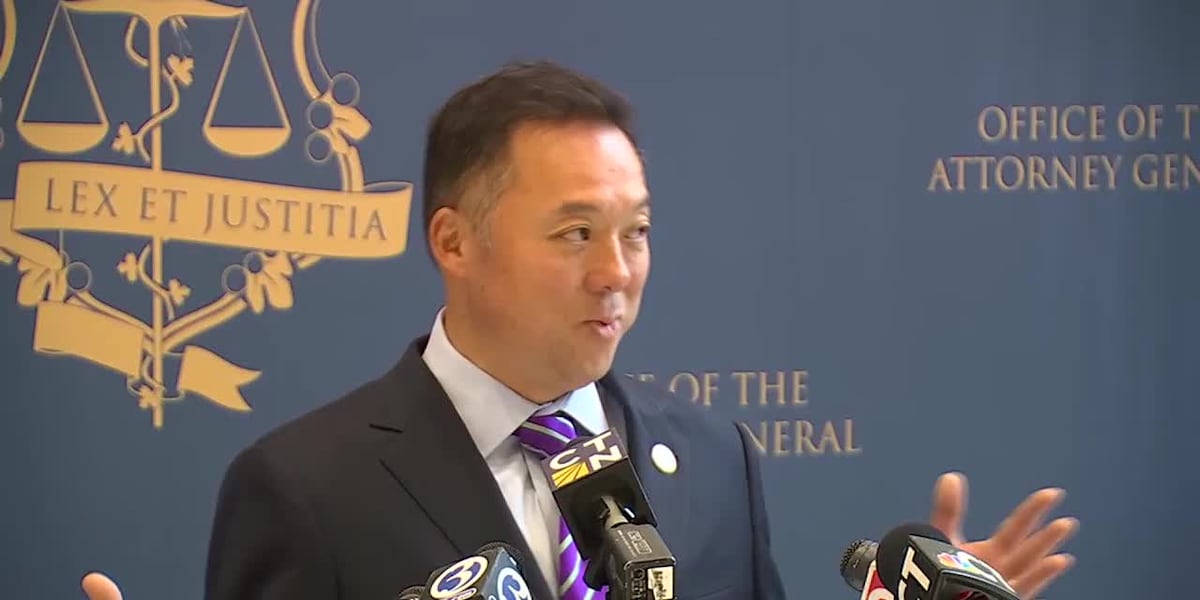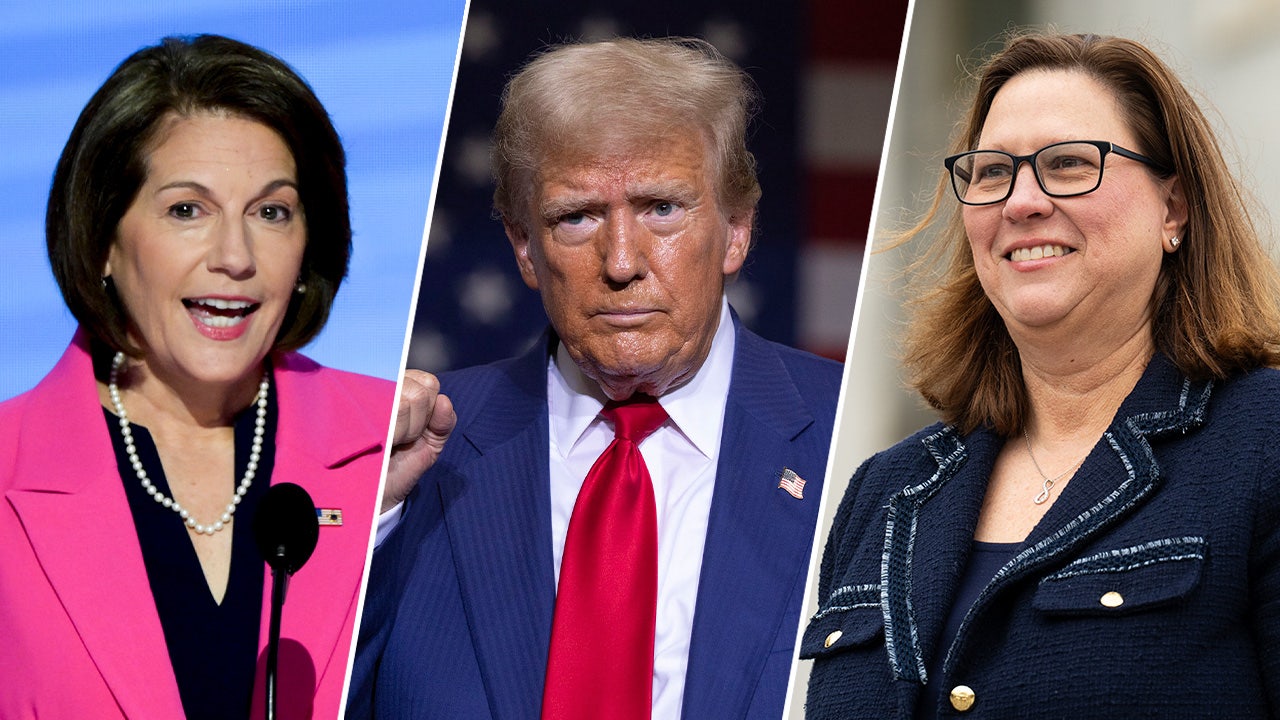Washington
Yellen says Washington might ‘respond to unintended consequences’ for China due to tech export curbs
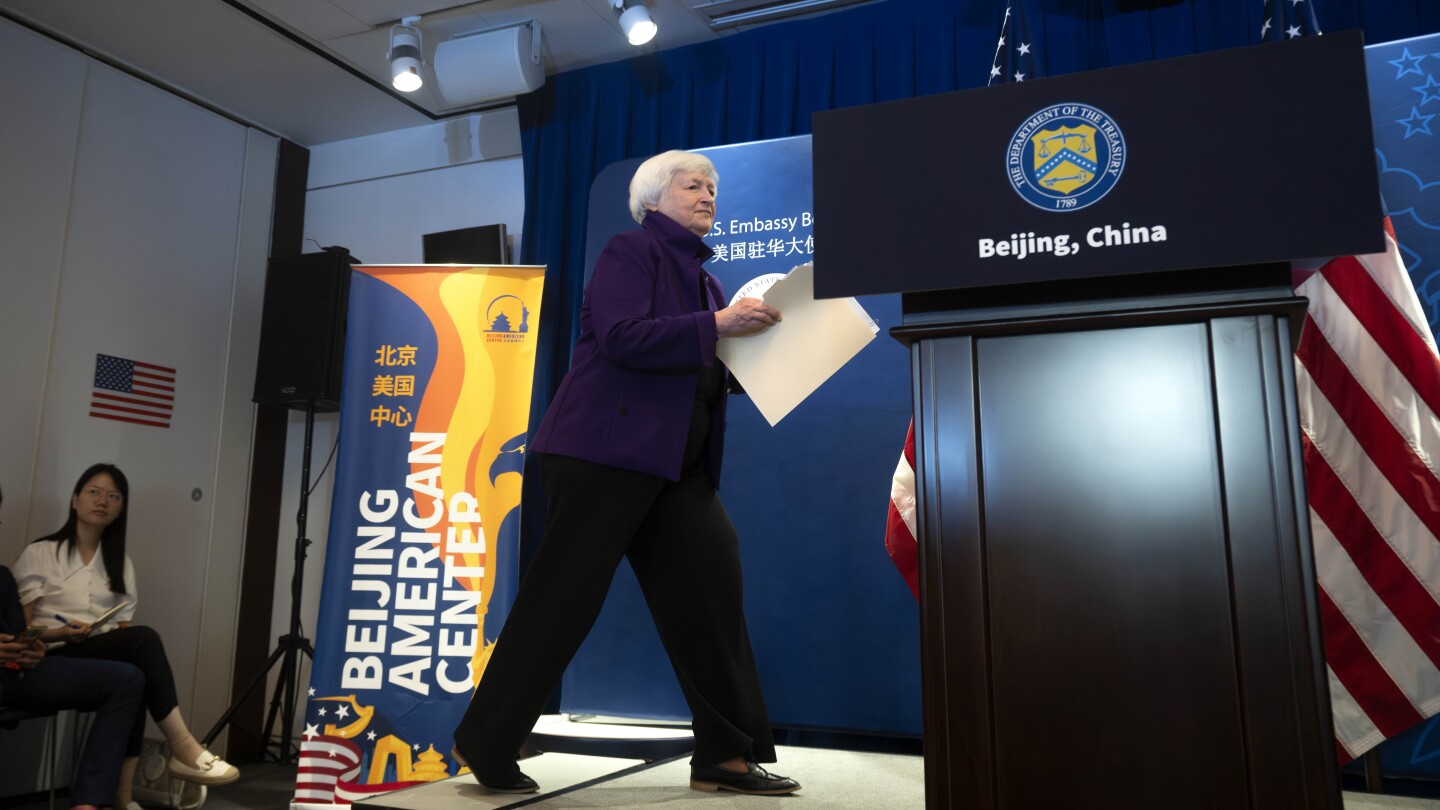
BEIJING (AP) — Treasury Secretary Janet Yellen on Sunday said she agreed Washington will listen to Chinese complaints about security-related curbs on U.S. technology exports and might “respond to unintended consequences” as she ended a visit to Beijing aimed at reviving strained relations.
Yellen defended “targeted measures” on trade that China’s leaders complain are aimed at hurting its fledgling tech industries. She said the Biden administration wants to “avoid unnecessary repercussions” but gave no indication of possible changes.
Relations between the two biggest economies are at their lowest level in decades due to disputes about technology, security and other irritants. A key Chinese complaint is limits on access to processor chips and other U.S. technology on security grounds that threaten to hamper the ruling Communist Party’s development of smartphones, artificial intelligence and other industries.
With Earth breaking average heat records, cities are sure to be giving a fresh look at their readiness plans for temperatures that can kill.
Chinese authorities say nine people are missing in a landslide sparked by heavy rains amid flooding and searing temperatures across much of the country.
Sheriff Greg Capers was the picture of a Texas lawman as he announced the capture of a suspected mass shooter.
New York City police say a man on a scooter fired a handgun in a string of random shootings that killed an 87-year-old and wounded three others.
“We will open up channels so that they can express concerns about our actions, and we can explain and possibly in some situations respond to unintended consequences of our actions,” Yellen said at a news conference.
Yellen talked with China’s No. 2 leader, Premier Li Qiang, and other officials during 10 hours of meetings. She had a five-hour session Saturday with her Chinese counterpart, Vice Premier He Lifeng. Treasury officials said in advance there were no plans for her to meet Chinese leader Xi Jinping.
Yellen received a warm welcome and prominent coverage by the state press, but Chinese officials gave no sign they would change industrial or other policies that Washington and other governments say violate Beijing’s free-trade commitments. On Saturday, He said Washington should “adopt a rational and pragmatic attitude” to improve relations.
On Sunday, Yellen announced no agreements on major disputes or plans for future activity but said her department and Chinese officials would have “more frequent and regular” communication.
U.S.-Chinese political strains are adding to uncertainty that is dampening the willingness of consumers and businesses to spend and invest.
China’s economic growth rebounded to 4.5% in the first quarter of 2023 from last year’s 3% after anti-virus controls on travel and business activity were lifted in December. But factory activity and consumer spending decelerated in the quarter ending in June.
Xi accused Washington in March of trying to hold back China’s industrial development.
Beijing has been slow to retaliate for U.S. technology restrictions, possibly to avoid disrupting its own industries. But three days before Yellen’s arrival, the government announced unspecified controls on exports of gallium and germanium, metals used in making semiconductors and solar panels. China is the biggest producer of both.
Yellen said she tried to reassure officials Washington doesn’t want to decouple or separate its economy from China, while it tries to “de-risk” trade.
The Biden administration is pressing semiconductor makers to move production to the United States to reduce reliance on Taiwan and other Asian suppliers, which is seen as a security risk. Washington wants to develop alternatives to Chinese supplies of rare earth elements, metals used in smartphones, wind turbines and other products.
“They have expressed some concern that de-risking amounts to decoupling,” Yellen said. She said she tried to “assure my Chinese counterparts that this is by no means the same thing.”
“The de-risking involves attention to clearly articulated and narrowly targeted national security concerns, as well as broader concern with diversifying our supply chains, which the United States is doing in a few important sectors,” she said.
Throughout her visit, Yellen appealed for “healthy economic competition,” a reference to complaints Beijing violates its free-trade commitments by subsidizing and shielding politically favored industries from private and foreign competition.
Yellen said she had expressed concern to Chinese officials about “coercive activities” against U.S. companies.
That follows raids on consulting firms and the detention of staff members without explanation and what the U.S. government says is arbitrary detention or prohibitions on people leaving China that some complain are used to pressure them in business disputes.
Chinese leaders are trying to revive investor interest, but foreign companies are uneasy about their status after Xi and other officials called for economic self-reliance. The ruling party has also expanded an anti-spying law that has fueled uncertainty about what law firms or consultants can do.
On Saturday, Yellen appealed to He for cooperation on climate change, the debt burdens of developing countries and other global challenges. She said their governments shouldn’t let disagreements about trade and security derail economic and financial relations.
Beijing broke off climate discussions with Washington last August in retaliation for a visit by then-Speaker Nancy Pelosi of the House of Representatives to Taiwan, the self-ruled island democracy claimed by China as part of its territory.
President Joe Biden’s climate envoy, John Kerry, is due to become the next senior official to visit China next week. China and the United States are the world’s top emitters of climate-changing carbon.
China signed an agreement last month to restructure the debt of Zambia, including billions of dollars lent under Beijing’s Belt and Road Initiative to build ports and other infrastructure across Asia and Africa. Treasury officials pointed to that as successful cooperation.

Washington
Donald Trump’s call for sweeping change puts Washington on notice
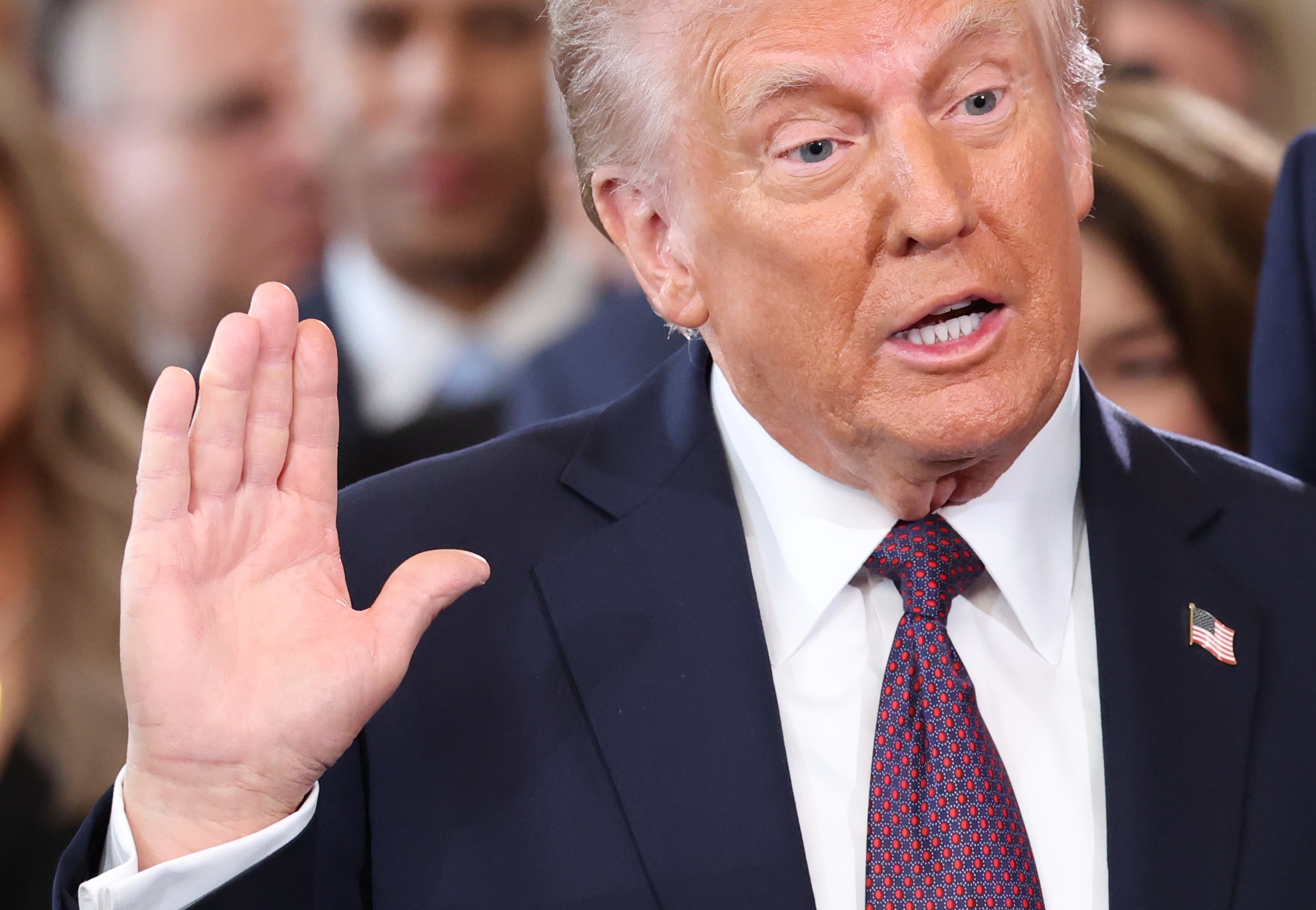
President Donald J. Trump began his second term with a dramatic pledge to sweep away the liberal gains made by Democrats under Joe Biden, saying in his inaugural address Monday that he planned to sign a historic number of executive orders right away to begin reshaping American society in his image while ushering in a new “golden age” for the nation.
Trump, who is expected to sign as many as 100 executive orders on his first day in office, said he’d focus immediately on his main campaign promise to crack down on illegal immigration and deport millions of undocumented people.
The president said he would declare a national emergency at the southern U.S. border, and a separate “national energy emergency” to increase domestic oil and gas production, part of an effort to roll back policies enacted by his predecessor to fight climate change.
Kevin Lamarque – Pool/Getty Images
With his second inaugural speech and the deluge of promised executive orders, Trump put Washington on notice that he plans to move swiftly on several major policy fronts at once, while also taking steps to put conservative values around diversity and inclusion at the center of government and public life.
Trump enters office riding a wave of political momentum with a Republican Party that’s largely united behind his policy proposals — unlike the start of his first term, when the GOP controlled Congress but was divided over his status as a political outsider and neophyte.
Now, Republicans also control the House and Senate, but the party’s leadership and rank-and-file is filled with MAGA loyalists.
Trump also now enjoys the support of powerful tech executives who are expected to have an influential voice in his administration. The list of business leaders on hand to watch Trump get sworn in included the billionaire Tesla CEO turned close Trump ally Elon Musk, Meta CEO Mark Zuckerberg and Amazon founder Jeff Bezos.
The tech titans were part of a paired-down group of dignitaries who packed into the Rotunda at the U.S. Capitol to attend the inaugural ceremony after it was moved indoors due to extreme cold — the first time that has happened since Ronald Reagan’s second inaugural in 1985.
The formal transfer of power Monday completed one of the most remarkable political comebacks in the country’s nearly 250-year history. Trump is just the second American president to serve two nonconsecutive terms. The other is Grover Cleveland, who accomplished the feat back in the late 19th century.
Trump made history in other ways as well. He is now the first occupant of the Oval Office with a felony conviction. Trump, who turns 79 in June, also became the oldest president at the time of his swearing-in ceremony, beating by approximately six months the record Biden set when he took office in 2021.
Trump’s return to power comes after an embattled four-year hiatus out of office following his failed effort to overturn the results of his 2020 election loss to Biden.
The setting of the swearing-in ceremony offered a stark reminder of the Jan. 6 attack on the Capitol, when an angry mob of Trump supporters took over the building — including the Rotunda, where Trump was sworn-in for his second term — in an unsuccessful attempt to stop Congress from certifying Biden’s election victory.
The violent insurrection overshadowed the final days of Trump’s first term and seemed at the time almost certain to rule out any future bid for the presidency.
But now, instead of ending his political career on a losing note — as a twice-impeached, one-term president — Trump will have four more years to put his stamp on the nation and a chance to further cement his legacy as the most consequential Republican president since Reagan.
Trump’s relatively brief remarks felt at times more like a wishlist-laden State of the Union speech to Congress than an inaugural address.
In addition to the plans to declare states of emergency around immigration and energy, Trump also said he would designate drug cartels as terrorist organizations; bring back “law and order” to American cities; end what he called the “chronic disease epidemic,” and send U.S. astronauts to Mars.
Trump said his administration would “end the government policy of trying to socially engineer race and gender into every aspect of public life,” adding, “we will forge a society that is color blind and merit-based.” He also declared it would be official U.S. government policy that there are “only two genders, male and female.”
The vision Trump laid out amounted to a stark repudiation of Democrats and represented a reversal of a yearslong effort by the party to address systemic racism, sexism and other societal issues in the economy, education and other areas.
Trump also warned the rest of the world to prepare for a return to the “America First” approach to foreign affairs that defined his first term as president. He said he would strengthen the U.S. military and claimed that “our power will stop all wars,” while saying he hoped he would be remembered as a “peacemaker and a unifier.”

Kenny Holston/The New York Times via AP, Pool
That point was driven home by a ceasefire and hostage deal in the process of being carried out thousands of miles away in Gaza, which was said to be heavily influenced by Trump’s return to power and the behind-the-scenes machinations of his Middle East envoy, Steve Witkoff, who worked closely with the Biden administration in its final days to secure the deal.
Trump’s speech differed from his first inaugural address in 2017 in other ways as well. When he took office eight years ago as a political outsider, Trump painted a dark picture of a failing nation crippled by poverty and crime. “This American carnage stops right here and stops right now,” Trump famously said at the time.
The president echoed that message to some degree in his second inaugural address, but in other moments he sought to strike a more optimistic tone. “We stand on the verge of the four greatest years in American history,” Trump said, then added, “We’re going to win like never before.”
The smaller indoor ceremony meant that thousands of people who traveled to the capital for the inauguration missed out on seeing Trump take the oath of office in person from the National Mall. But Trump supporters still blanketed the city at parties and events in his honor that will continue through the night Monday, signaling the changing of the guard.
After Trump was sworn in, Biden departed the Capitol to deliver the traditional farewell address before leaving Washington to start his post-presidency. After speaking to supporters downstairs from the Rotunda, Trump was set to attend a Congressional luncheon before signing the first of his many expected executive orders from the Capital One Arena across town, where thousands of his supporters had gathered in anticipation.
Washington
WA lawmakers look at making packaging producers pay for recycling • Washington State Standard

Washington’s recycling system may soon get a makeover.
A proposal to require companies to reduce unnecessary packaging and fund statewide recycling services is making its way through the Legislature this year.
The goal is to give more people the opportunity to recycle more types of products and to incentivize packaging producers to use sustainable materials, said bill sponsor Rep. Liz Berry, D-Seattle. Currently, what can be recycled differs by city, and 11 counties have no recycling services at all. Under this proposal, everyone in the state would use the same system.
“Recycling will become really affordable, really convenient and really equitable,” Berry told the Standard. “It will create this circular, sustainable economic model for recyclable materials.”
Berry’s bill is similar to laws passed recently in Maine, Oregon, California, Colorado and Minnesota. Different versions of the legislation have been debated in Washington during the past two years but never became law.
Under the program, manufacturers, brands and importers must join a statewide “producer responsibility organization.”
Producers are required to pay membership fees to that organization to cover the cost of a new recycling system. Fees vary based on the types of products a company uses. If a producer uses more sustainable materials, for example, they would likely pay less.
If a producer does not want to join the statewide organization, they must register as an individual and pay annual fees to the state.
A national producer responsibility organization already exists to help implement this type of system in California, Colorado and Maryland.
By March 2029, producers who are not members of the organization or registered with the state could not sell their products in Washington.
Under the bill, the Department of Ecology would develop a list of recyclable materials in Washington. Most plastic packaging and paper products sold, distributed or shipped into and within the state would likely be covered.
The Department of Ecology would also work on a new education campaign — paid for by producer fees — to make sure all residents know what products they can recycle.
Brenda Fincher, a Kent City Council member, said that the statewide education piece will help clear up confusion.
“It’s uncountable the number of times that I’ve heard that recycling is not happening or that everything can be recycled,” Fincher said at a Thursday press conference. “It’s confusing for the residents right now.”
There would be some exemptions under the proposal. Government entities and charitable organizations would not have to take part. Packaging on infant formula, nutritional supplements, medical equipment and drugs, and hazardous products would be among those not covered.
If the bill passes, residents could expect to see a change in how they recycle within the next five years, Berry said. The program would be fully implemented within 10 years of passage.
‘Streamlined’ bill
This year’s proposal is supported by environmental groups, cities and counties, labor unions, medical professionals and some producers.
Dr. Mark Vossler, with Washington Physicians for Social Responsibility, said plastic pollution is having negative health effects, especially for those who live close to industrial sites.
“This is a tremendous environmental justice concern,” Vossler said at a Thursday press conference. “Accountability measures will incentivize companies to move away from toxic or harmful packaging materials.”
Berry said she is hopeful this is the year the proposal finally passes. This version is “shorter and more streamlined” than in the past, and it’s mostly based on the Minnesota bill that became law last year and had broad support, she said.
Berry added that she’s worked on the bill for years and has found many compromises with those who were previously opposed.
“I’m really hoping that members of the Legislature will see how isolated the opposition is at this point and understand that what we’re trying to do is something positive for our state,” she said.
The bill is expected to receive a public hearing in the House Environment and Energy Committee on Tuesday.
Pushback
Despite broad support, the legislation could still run into stiff opposition, particularly from manufacturers, businesses and waste management companies.
Rep. Mary Dye, R-Pomeroy, said in a statement that she and other Republicans have concerns that the bill would enact “expensive mandates” that could increase costs for consumers.
“I believe we need to spend wisely by targeting investments to underperforming counties to increase recycling,” Dye said. “We do not need to put new fee increases on packaged products during our current affordability crisis.”
Dye is among those supporting a different recycling bill that does not require businesses to pay.
That proposal would require producers to register and report their paper products and packaging to the Department of Ecology, which would create a public list of recyclable materials. The bill would also set new standards for how much recyclable material must be in certain products. And it would provide recycling discounts for low-income households.
Rep. Jake Fey, D-Tacoma, is sponsoring this other bill, which has bipartisan support. In a hearing on Thursday, it received backing from business groups, waste management companies, and food and hospitality organizations. Local government organizations, environmental groups and utilities were among those who testified against the bill.
Washington
Washington braces for Trump Inauguration
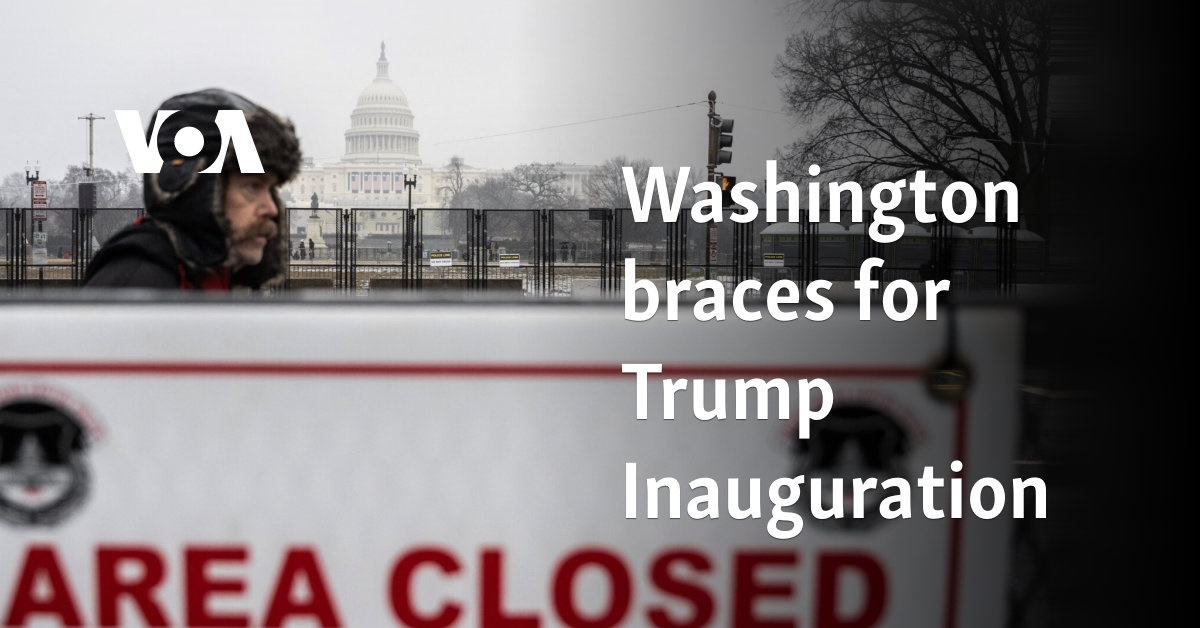
Metal fences, concrete barriers and security checkpoints still line many the walkways and cross streets of the National Mall – extending from the U.S. Capitol down past some of Washington’s most noted landmarks – as the nation prepares to swear in its 47th president.
But while the 0.6-square-kilometer (146-acre) swath of land is often the highlight of many a tourist visit, it is no longer the focus of security efforts for when President-elect Donald Trump takes the oath of office for a second time.
Frigid temperatures forecast for much of Monday led Trump to move the festivities inside – the inauguration to the U.S. Capitol Rotunda and the traditional inaugural parade to the nearby Capital One Arena.
The changes, first announced Friday, presented a last-minute hitch for security and law enforcement officials, who had been planning for the inauguration for the past year.
And it has left them, and the approximately 25,000 law enforcement and military personnel charged with security, with multiple challenges.
“We will shift those assets,” said the U.S. Secret Service’s Matt McCool, briefing reporters Sunday.
“We have not cut anything from what our original plan was,” he said. “I’m very confident, with our partners here, we will be ready.”
The numbers could make the situation especially trying.
Organizers had expected about 250,000 ticketed guests to descend on the U.S. Capitol and the National Mall to watch the inauguration.
Only a select few will be allowed into the Capitol Rotunda, which accommodates just 600 people. And the Capital One Area seats just 20,000.
If even just a fraction of the 250,000 people who had planned on attending the inauguration try to get to the arena, there could be a crunch.
Washington Metropolitan Police Chief Pamela Smith said Sunday her force, bolstered by and about 4,000 police officers from across the U.S., will be ready.
“Nothing has really changed,” Smith told reporters. “The police officers that were committed and dedicated to coming here, we’ll be flexible in how we’ll adjust [their] movement. … So, we will still have police officers in places and spaces around our city as we initially planned.”
Some of those officers, Smith said, will still be assigned to the original parade route in anticipation that some people will try to get a glimpse of the presidential motorcade as it goes by.
U.S. Capitol Police said they also anticipate having officers on the periphery of the West Front of the Capitol – now closed off with the inauguration moved indoors – ready to direct ticketed guests who will no longer be able to attend.
In addition, the inaugural security contingent, which includes the U.S. Secret Service, the FBI, U.S. Capitol Police, Washington Metropolitan Police, and some 7,800 members of the U.S. Army and Air National Guard, will all be coordinated from a command center linked into an expanded network of cameras keeping watch on the city.
And though security measures in some areas, including along parts of the National Mall, have been relaxed, officials said there will be plenty of reminders for anyone coming to Washington that this is no ordinary time.
“They will see tactical teams,” McCool said, during an earlier briefing with reporters last week. “They’ll see, officers and agents on rooftops, they’ll see checkpoints. They’ll see road closures and barriers in concrete.”
Even before the inauguration was moved inside, officials had been preparing for what they described as “a higher threat environment,” cautioning the security plans for this inauguration were already more robust than in the past.
“The biggest threat, I think, for all of us remains the lone actor,” said Capitol Police Chief Tom Manger. “That threat … remains the biggest justification for us being on this heightened stage state of alert.”
Those concerns were heightened following the New Year’s Day terror attack and truck ramming in New Orleans and the Las Vegas Cybertruck explosion outside the Trump International Hotel in Las Vegas, Nevada.
Earlier this month Capitol Police arrested two men suspected of trying to disrupt the state funeral for former U.S. President Jimmy Carter, one who tried to bring knives and a machete into the Capitol and another who set their car on fire.
Research, including a recent survey by the University of Chicago Project on Security and Threats, adds to the concerns.
“Over 5% of the American public supports the use of force to prevent Donald Trump from becoming president,” Robert Pape, the project’s director, told VOA.
“That equates to 14,000,000 American adults,” he said. “That’s an unfortunately disturbing number.”
Already, Trump was also the target of two attempted assassinations.
There is also an ongoing threat from Iran. Despite repeated Iranian denials, U.S. security and law enforcement officials have accused Tehran of trying to kill Trump, unveiling one plot set to be carried out last year, in the days after the U.S. presidential election.
For now, though, U.S. officials see no signs of impending trouble.
“The FBI is not currently tracking any credible or specific threats to the inaugural ceremony or the Capitol complex,” the bureau’s Washington Field Office told VOA. “We will continue to work closely with our partners to share information and identify and disrupt any threats that may emerge.”
Another source for concern is the tens of thousands of protesters, though so far, there have been no major incidents.
Saturday’s People’s March, which was permitted to have as many as 50,000 protesters, sparked only brief tensions with Trump supporters.
Another group, called We Fight Back, has permits for protests involving about 10,000 people in across several locations on Monday.
“Please note that [we] will ensure your right to peacefully protest and assemble,” said the Metropolitan Police Department’s Smith.
“However, I want to reiterate, as I always have, that violence, destruction and unlawful behavior will not be tolerated,” she said. “Offenders will face swift and decisive consequences … anyone who thinks that they can come into this city to destroy property, we will be prepared to deal with them.”
Kim Lewis contributed to this report.
-

 Science1 week ago
Science1 week agoMetro will offer free rides in L.A. through Sunday due to fires
-
/cdn.vox-cdn.com/uploads/chorus_asset/file/23935558/acastro_STK103__01.jpg)
/cdn.vox-cdn.com/uploads/chorus_asset/file/23935558/acastro_STK103__01.jpg) Technology1 week ago
Technology1 week agoAmazon Prime will shut down its clothing try-on program
-
/cdn.vox-cdn.com/uploads/chorus_asset/file/25826211/lorealcellbioprint.jpg)
/cdn.vox-cdn.com/uploads/chorus_asset/file/25826211/lorealcellbioprint.jpg) Technology1 week ago
Technology1 week agoL’Oréal’s new skincare gadget told me I should try retinol
-
/cdn.vox-cdn.com/uploads/chorus_asset/file/25832751/2192581677.jpg)
/cdn.vox-cdn.com/uploads/chorus_asset/file/25832751/2192581677.jpg) Technology5 days ago
Technology5 days agoSuper Bowl LIX will stream for free on Tubi
-

 Business6 days ago
Business6 days agoWhy TikTok Users Are Downloading ‘Red Note,’ the Chinese App
-
/cdn.vox-cdn.com/uploads/chorus_asset/file/25835602/Switch_DonkeyKongCountryReturnsHD_scrn_19.png)
/cdn.vox-cdn.com/uploads/chorus_asset/file/25835602/Switch_DonkeyKongCountryReturnsHD_scrn_19.png) Technology3 days ago
Technology3 days agoNintendo omits original Donkey Kong Country Returns team from the remaster’s credits
-

 Culture2 days ago
Culture2 days agoAmerican men can’t win Olympic cross-country skiing medals — or can they?
-
/cdn.vox-cdn.com/uploads/chorus_asset/file/24774110/STK156_Instagram_threads_1.jpg)
/cdn.vox-cdn.com/uploads/chorus_asset/file/24774110/STK156_Instagram_threads_1.jpg) Technology1 week ago
Technology1 week agoMeta is already working on Community Notes for Threads



